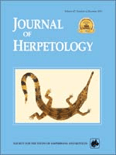
JOURNAL OF HERPETOLOGY
Scope & Guideline
Exploring the Wonders of Herpetofauna
Introduction
Aims and Scopes
- Biodiversity and Conservation:
The journal emphasizes studies on the diversity, distribution, and conservation status of amphibians and reptiles, often addressing endangered species and their habitats. - Ecology and Behavior:
Research published in this journal often explores ecological interactions, behavioral adaptations, and the impact of environmental factors on herpetofaunal populations. - Systematics and Phylogenetics:
The journal features contributions that focus on the taxonomic classification, phylogeography, and evolutionary relationships among herpetofauna, contributing to a better understanding of species diversity. - Genetics and Physiology:
There is a consistent focus on population genetics and physiological studies, examining genetic diversity, adaptations, and the effects of climate change on herpetological species. - Human-Wildlife Interactions:
Studies addressing the relationship between humans and herpetofauna, including ethnomedicine and the effects of anthropogenic activities on species survival, are also a core area of focus.
Trending and Emerging
- Climate Change and Its Impacts:
Research focusing on the effects of climate change on herpetofaunal diversity and distribution is increasingly prominent, reflecting a global concern for biodiversity amidst changing environmental conditions. - Conservation Strategies and Practices:
There is a growing emphasis on practical conservation strategies, including habitat restoration, species management, and community-based conservation efforts, highlighting the need for actionable solutions. - Genomic and Genetic Research:
Studies employing genomic techniques to investigate genetic diversity, population structure, and evolutionary processes are on the rise, illustrating the importance of molecular methods in contemporary herpetological research. - Ecological Interactions and Community Dynamics:
Emerging research emphasizes ecological interactions among species and their communities, particularly how these dynamics affect conservation outcomes and species resilience. - Anthropogenic Effects on Herpetofauna:
There is an increasing focus on the impact of human activities, such as habitat destruction and pollution, on herpetological populations, underscoring the need for integrated conservation approaches.
Declining or Waning
- Morphological Studies:
While morphology remains important, there has been a noticeable decline in the number of studies dedicated solely to morphological descriptions, as the field shifts towards molecular and ecological approaches. - General Taxonomy without New Insights:
Research that merely revisits taxonomic classifications without providing new findings or insights into species diversity or conservation is becoming less common. - Historical Ecology:
There is a reduction in studies focused on historical ecological perspectives, as the journal's emphasis has shifted towards contemporary issues related to conservation and ecological interactions.
Similar Journals
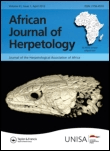
AFRICAN JOURNAL OF HERPETOLOGY
Cultivating a Global Community for Herpetology EnthusiastsThe AFRICAN JOURNAL OF HERPETOLOGY, published by TAYLOR & FRANCIS LTD, serves as a pivotal resource in the field of herpetology, encompassing the study of reptiles and amphibians. With an ISSN of 2156-4574 and an E-ISSN of 2153-3660, this journal offers a platform for researchers to disseminate their findings and advance knowledge in this dynamic area of biology. Recognized in 2023 with a category quartile ranking of Q2 in Animal Science and Zoology and Q3 in Ecology, Evolution, Behavior, and Systematics, the journal highlights impactful research to a global audience. By providing access to robust, peer-reviewed content, the journal contributes significantly to ongoing debates and discoveries, thus appealing to academics, professionals, and students alike. The journal's converged publication years, spanning from 1996 to 2000 and from 2002 to 2024, signify a long-standing commitment to the field, ensuring that emerging trends and critical issues in herpetology remain at the forefront. Engaging with this journal not only enhances your understanding of amphibian and reptile biology but also connects you to a community dedicated to the conservation and sustainable management of these vital species.

AUSTRALIAN JOURNAL OF ZOOLOGY
Connecting Scholars to the Wonders of ZoologyAustralian Journal of Zoology, published by CSIRO PUBLISHING, serves as a premier platform for research in the fields of animal science and zoology, with a profound commitment to advancing our understanding of wildlife and ecosystems. Featuring an ISSN of 0004-959X and an E-ISSN of 1446-5698, this esteemed journal encompasses a wide range of topics relevant to ecology, evolution, behavior, and systematics. For the year 2023, it holds a commendable Q2 ranking in both Animal Science and Zoology and Ecology, Evolution, Behavior, and Systematics, demonstrating its significant impact within the academic community. With a rich publication history spanning from 1952 to 2024, the journal caters to researchers, professionals, and students by disseminating crucial findings and methodologies that contribute to effective conservation efforts and informed ecological practices. Although not an open access journal, it continues to foster collaboration and discussion among scholars in Australia and beyond. Located in Clayton, Victoria, the journal remains dedicated to its objective of enhancing knowledge in zoological sciences and addressing vital environmental challenges.
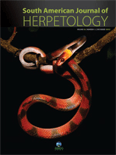
South American Journal of Herpetology
Exploring the rich diversity of amphibians and reptiles.South American Journal of Herpetology is a vital resource in the field of herpetology, published by the Sociedade Brasileira de Herpetologia. Established to advance the study of amphibians and reptiles, this journal aims to bridge the gap between regional science and global research. As an influential platform operating from Brazil, it serves as a forum for researchers, professionals, and students dedicated to understanding the rich diversity of South American herpetofauna. With a focus on innovative studies and critical reviews, the journal has been categorized in the Q3 quartile for both Animal Science and Zoology and Ecology, Evolution, Behavior and Systematics as of 2023, indicating a growing impact within these disciplines. Although currently not open access, it offers unique insights into the ecological and evolutionary aspects of herpetology, contributing significantly to discussions on conservation and biodiversity. The journal is housed at the prestigious Museu de Zoologia da Universidade de São Paulo, ensuring high academic standards and engagement with leading researchers in the field.

Acta Herpetologica
Advancing Herpetological Knowledge for a Sustainable FutureActa Herpetologica, published by FIRENZE UNIV PRESS, is a reputable Open Access journal dedicated to the field of herpetology, encompassing research on amphibians and reptiles. Established with the aim to foster scientific discourse, this journal has made its content freely accessible since 2006, enabling researchers, professionals, and students to engage with a diverse array of studies and findings. As of 2023, the journal is categorized in Q3 of Animal Science and Zoology and ranks 357 out of 490 in the Scopus database, reflecting its contribution to the field and providing a platform for high-quality research. The journal showcases manuscripts that cover a wide range of topics, from ecology and conservation to physiology and evolution, supporting global efforts to understand and preserve herpetofauna. With a convergence period spanning from 2009 to 2024, Acta Herpetologica continues to be an essential resource for advancing academic knowledge and facilitating discussions in herpetological research.

PAKISTAN JOURNAL OF ZOOLOGY
Connecting researchers to foster global zoological discourse.Pakistan Journal of Zoology, established in 1975 and published by the Zoological Society of Pakistan, is a pivotal resource in the field of zoology and animal science, contributing to the academic discourse and research advancements in the region. With an ISSN of 0030-9923, this journal strives to disseminate innovative research findings and scholarly articles that explore various facets of animal biology, ecology, and conservation. Although classified in the Q4 quartile within the animal science category, its commitment to providing a platform for emerging researchers makes it crucial for those in the zoological community. The journal covers a broad range of topics relevant to contemporary issues in zoology, promoting both local and international collaborations. Situated in Lahore, Pakistan, its contributions are vital for promoting biodiversity awareness and conservation efforts within the region. Accessible research outputs empower students and professionals alike to engage in critical discussions and applications within the disciplines of zoology and animal science.

ZHURNAL OBSHCHEI BIOLOGII
Celebrating Over 75 Years of Biological ResearchZHURNAL OBSHCHEI BIOLOGII, published by MEZHDUNARODNAYA KNIGA in the Russian Federation, is a venerable journal with a rich history originating in 1945. Renowned for its contributions to the fields of Ecology, Evolution, Behavior, and Systematics, as well as Medicine (miscellaneous), this journal provides a platform for researchers and professionals to disseminate significant findings within these domains. Although currently not classified as an open access publication, ZHURNAL OBSHCHEI BIOLOGII holds a Q4 quartile designation in its respective categories, reflecting its unique positioning within the global research landscape. While its coverage in Scopus is limited, the journal remains an important resource for academics interested in the evolution of biological sciences, especially within the context of Russian research traditions. By fostering scholarly communication and collaboration, ZHURNAL OBSHCHEI BIOLOGII continues to play a critical role in advancing knowledge in the biological sciences.
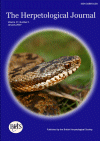
HERPETOLOGICAL JOURNAL
Illuminating the path for future herpetological research.Herpetological Journal, published by the British Herpetological Society, is a prominent platform dedicated to publishing high-quality research in the fields of herpetology, ecology, and conservation. With its ISSN 0268-0130, this journal has established a significant presence in the academic community, especially as it continues its publication journey from 1987 to 2024. Notably, the journal boasts a commendable impact factor, being ranked in the second quartile (Q2) for Animal Science and Zoology, and holds a third quartile (Q3) ranking in other essential categories including Ecological Modeling and Ecology, Evolution, Behavior and Systematics. The Herpetological Journal serves as an indispensable resource for researchers, professionals, and students, fostering the exchange of innovative ideas and insights crucial to the understanding of reptiles and amphibians. Although the journal currently does not offer open access, it remains a vital choice for those invested in the ongoing dialogue around herpetological studies and nature conservation.

NOVITATES CARIBAEA
Navigating the Depths of Caribbean Natural HeritageNOVITATES CARIBAEA is a distinguished academic journal dedicated to the exploration of Caribbean natural history, fostering a deep understanding of the region's biodiversity and ecological significance. Published by the MUSEO NACIONAL HISTORIA NATURAL-SANTO DOMINGO, this open-access journal has been a platform for scholarly communication since 2009, aiming to provide unrestricted access to high-quality research outputs. With its commitment to promoting research in Caribbean ecosystems, NOVITATES CARIBAEA plays a crucial role in the academic community, facilitating knowledge exchange among researchers, professionals, and students. The journal welcomes submissions exploring various aspects of natural history, including taxonomy, conservation biology, and ecological studies, making it an essential resource for those dedicated to understanding and preserving the unique environments of the Caribbean.

AMPHIBIAN & REPTILE CONSERVATION
Elevating Awareness of Amphibian and Reptile ChallengesAMPHIBIAN & REPTILE CONSERVATION, published by the Amphibian Conservation Research Center & Lab, is a leading journal dedicated to the field of herpetology and environmental conservation. With an ISSN of 1083-446X and an E-ISSN of 1525-9153, this journal serves as a vital resource for researchers, conservationists, and students interested in the preservation of amphibian and reptile species. The journal has achieved remarkable rankings, categorized in the Q2 quartile for Animal Science and Zoology, Ecology, and Nature and Landscape Conservation as of 2023, reflecting its significant contribution to the scientific community. Over the converged years from 2016 to 2024, the journal has established itself as an integral platform for disseminating research findings, fostering collaboration, and enhancing the understanding of biodiversity and ecosystem dynamics. By embracing an open-access approach, AMPHIBIAN & REPTILE CONSERVATION ensures that critical research is readily available to a global audience, promoting informed conservation efforts and policy advocacy to safeguard these vital species amidst their declining populations.
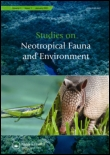
STUDIES ON NEOTROPICAL FAUNA AND ENVIRONMENT
Illuminating the Path to Conservation in the TropicsSTUDIES ON NEOTROPICAL FAUNA AND ENVIRONMENT is a distinguished academic journal published by Taylor & Francis Ltd, dedicated to advancing the fields of Animal Science, Zoology, and Ecology. With an ISSN of 0165-0521 and an E-ISSN of 1744-5140, this journal has been a significant outlet for scholarly research since its inception in 1976, continuing to provide critical insights into neotropical biodiversity and the environmental intricacies of this rich ecological region through 2024. Recognized in the Q3 category for both Animal Science and Ecology, the journal ranks at #232/490 in Animal Science and Zoology and #402/721 in Ecology, marking it as a valuable resource for researchers, professionals, and students interested in ecological and zoological studies. By offering a platform for innovative research and comprehensive reviews, the journal aims to bridge the gap between theory and practical application, facilitating a deeper understanding of the unique challenges and conservation strategies relevant to neotropical ecosystems. Although not an open-access journal, it plays a crucial role in fostering academic discourse and knowledge dissemination in its field, ensuring that critical advancements in understanding neotropical fauna and environmental dynamics reach a diverse and engaged audience.